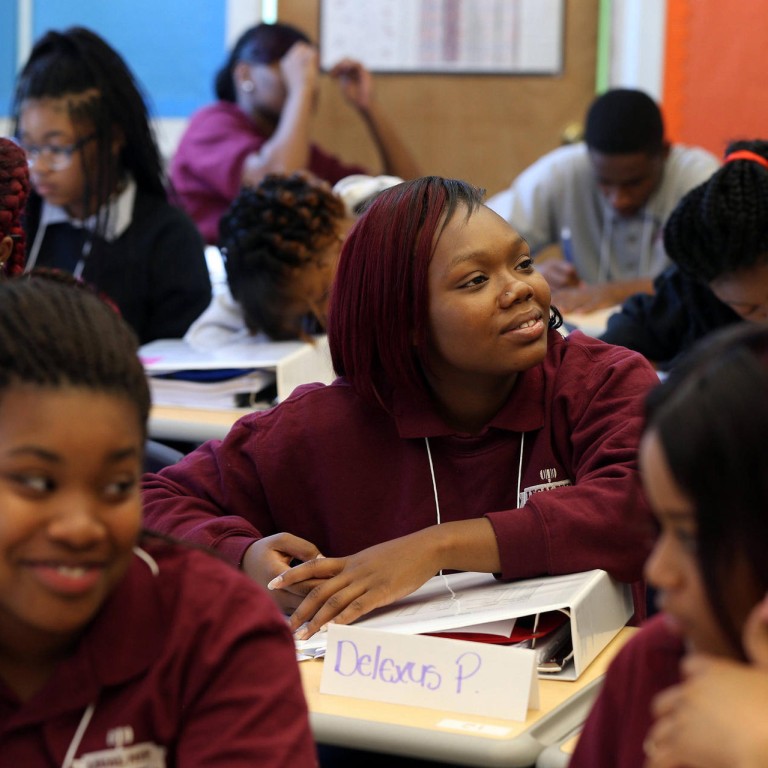
The Chicago high school that's training more blacks to study law
Charter school founded in 2012 in one of city's bleakest neighbourhoods with mission to attract more minorities to the legal profession and give them the tools to build better lives
It was the first day of school, and Jamaurion Leverston was glad to be back. He spent much of the summer indoors - a conscious decision to protect a precious opportunity by avoiding trouble in his neighbourhood.
"I can't afford to be at the wrong place at the wrong time," he says. "Not when I'm so close to making something of myself."
Leverston, 17, is in his final year at Legal Prep Charter Academy in Chicago, the only legal-themed high school in the US state of Illinois and one of few in the nation. Three years ago, it opened its doors with about 150 students in one of the city's bleakest neighbourhoods. Its mission: to attract more minorities to the legal profession and give them the tools to build better lives.
The inaugural class is beginning its final year, and 81 students who started three years ago remain. That class also includes 14 transfer students. They are joined by three other classes of students for a total enrolment of about 300 - virtually all of them black - who are accepting strict disciplinary standards and rigorous classes that emphasise critical thinking, written and oral communication.
Encouraging signs include enrolment gains and the expansion of extracurricular activities and "advanced placement" classes.
But co-founders Rather Stanton and Sam Finkelstein say they will not declare victory until every student has been accepted to university - and graduates.
We will visit, we will call, and we will make sure they have enough money for books and rent. Otherwise everything we did here was for nothing
Mindful of the dismal graduation rates for minorities in university, they intend to follow students throughout their post-secondary education.
"We will visit, we will call, and we will make sure they have enough money for books and rent. Otherwise everything we did here was for nothing," Finkelstein says. They plan to fulfil that goal by creating a special fund, with some donors already stepping up, he says.
Since the school opened in autumn 2012, it has added sports and dozens of extracurricular activities, from the Steppers dance programme to a chess club. Staff led 16 third-year students on a spring break college tour throughout the south. The school hired its first full-time guidance counsellor, the former vice-president of admissions at Lake Forest College, a tertiary institution in suburban Chicago. Lawyers from some of the city's top firms have taught classes and serve as mentors, hoping to increase diversity in the legal pipeline, which is overwhelmingly white.
There have been challenges. Fundraising is a constant concern. The first principal left amid philosophical differences, and Finkelstein took on the role. Students, too, have come and gone, an eviction notice or utility cut-off away from academic traction. "Home is transient," says Stanton, who is also Legal Prep's development director.

While charter schools are not a panacea - some fare worse than their traditional neighbourhood counterparts - they typically have smaller classes and are not bound by the same rules and regulations that govern non-charters.
When Legal Prep's third-year class took one of the evaluation tests for university in March, the average score was 16.7, compared with the Illinois state average of 20. School officials required everyone to retake the exam in June, and the average increased to 17.7. Staton is optimistic the average will continue to rise.
Legal Prep is in the Chicago Public Schools system. About 90 per cent of its US$4 million annual budget comes from the state; the rest must come from private donations, Stanton says.
"Because of the flexibility that charter schools are given, each can tailor its curriculum to the student body, which results in a more engaging educational experience. At the same time, it can be very empowering for teachers, attracting a different kind of teacher workforce into the classroom," says Jordan Posamentier, deputy policy director of the Centre on Reinventing Public Education at the University of Washington in Seattle. "They can also be more responsive than a traditional school, adjusting or extending learning time as needed."
Legal Prep, for example, added a second, remedial maths class for first-year students after a few short discussions, instead of waiting until the following year. The curriculum includes a heavy dose of legal prerequisites, as well, including law seminars for fourth-year students.
Stanton and Finkelstein, both lawyers, hatched the idea for the school in 2009.
They had been working at a non-profit that ran a summer programme designed to increase children's interest in law. "But we were just sending them back to crummy high schools," Stanton says. "Sam came to my office, shut the door and said: 'Do you want to start a school?'"
Two weeks later, both had quit their jobs and dived into the project, looking for buildings and recruiting teachers.
Tribune News Service
